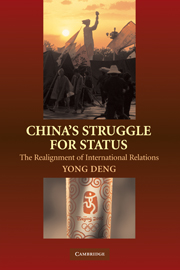Book contents
- Frontmatter
- Contents
- Figure and Tables
- Preface
- 1 Introduction
- 2 International Status and Chinese Foreign Policy
- 3 Negotiating the Human Rights Standard
- 4 Reacting to “China Threat Theories”
- 5 Strategic Partnerships with Russia, the European Union, and India
- 6 Independent Rivalry with Japan
- 7 Rediscovering Asia and Africa: The Multilateral Turn
- 8 Taiwan and China's Rise
- 9 China's Foreign Relations and the Emerging Great-Power Politics
- Index
9 - China's Foreign Relations and the Emerging Great-Power Politics
Published online by Cambridge University Press: 05 September 2012
- Frontmatter
- Contents
- Figure and Tables
- Preface
- 1 Introduction
- 2 International Status and Chinese Foreign Policy
- 3 Negotiating the Human Rights Standard
- 4 Reacting to “China Threat Theories”
- 5 Strategic Partnerships with Russia, the European Union, and India
- 6 Independent Rivalry with Japan
- 7 Rediscovering Asia and Africa: The Multilateral Turn
- 8 Taiwan and China's Rise
- 9 China's Foreign Relations and the Emerging Great-Power Politics
- Index
Summary
After the cold war, Chinese leaders chose a foreign policy course that recognizes the unique set of constraints and opportunities in world politics characterized by an authority structure centered on U.S. hegemony and an open, contested great-power politics embedded in globalization. This path of quest for great-power status sets it apart from both the predominant patterns of Chinese foreign policy in the previous eras and traditional great-power politics as posited by mainstream international relations (IR) theories. Focusing on China's foreign policy paradigm in the post–cold war era, this study joins the growing literature taking note of the striking absence of a balance of power in current world politics. It further shows how a reconfigured national identity and interest conception has characterized the PRC's struggle to gain control over cross-Strait relations, extend its influence beyond Asia, and ultimately move from the periphery to the center stage in regional and world politics. In investigating the international politics surrounding China's rise, we also hope to illuminate some emerging dynamics of great-power politics.
China in the World: An Uphill Struggle
In the aftermath of the cold war, Chinese political elites quickly realized their country's foreign policy challenge did not just derive from its material weakness but also from its disadvantaged position in the newly emerging world order. Relegated to a pariah status after the Tiananmen crisis in 1989, the PRC was largely excluded from the restructuring of the world order.
Information
- Type
- Chapter
- Information
- China's Struggle for StatusThe Realignment of International Relations, pp. 270 - 294Publisher: Cambridge University PressPrint publication year: 2008
